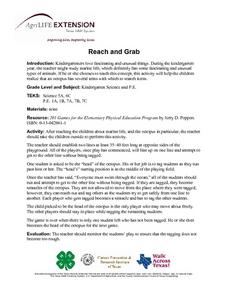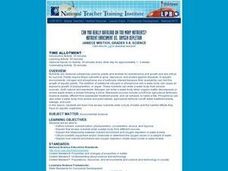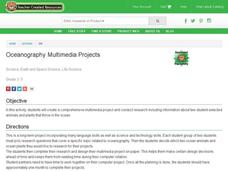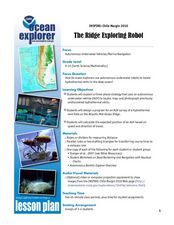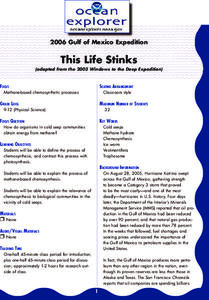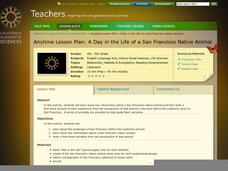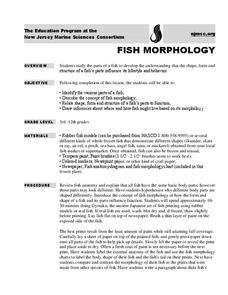Curated OER
Exploring the Beach
Students explore the beach. For this marine habitat lesson, students inspect sand grains, design beach profiles, classify marine life, and examine natural beach habitats. Students use spreadsheets to record data from their activities at...
Curated OER
World Oceans
In this geography worksheet, learners list the five oceans and write the names of the different sea life found in each ocean. Students choose from a list of different ocean animals.
Curated OER
Hurricane Scramble
In this earth science worksheet, students unscramble various types of sea creatures caught in a hurricane and writing their name on the lines provided. Then they draw a picture of their favorite sea creature.
Curated OER
Gifts From the Sea
In this marine animal worksheet, 3rd graders study the parts of seaweed. Students label 2 seaweed diagrams and study 24 household objects, circling those that come from seaweed extracts and/or ingredients.
Alabama Learning Exchange
Diverse Life Forms of the Ocean
Young scholars recognize marine organisms and differentiate between plankton and nekton. In this investigative instructional activity students create a concept map using their list of terms and study marine life forms.
Curated OER
Reach and Grab
Students examine the different types of marine life and participate in an activity to show the many arms of an octopus.
Curated OER
Looking for Clues
Young scholars infer the cause of a shipwreck based upon information about artifacts found in the wreck. In this marine archeology lesson, students use an inventory list to infer the cause of a shipwreck. Young scholars discuss the...
Curated OER
Life in the Kelp Forest
Young scholars research and create a marine food web to learn about plants and animals in a kelp forest. For this marine food web lesson, students draw lines between kelp forest predators and prey and show the flow of energy in the food...
Curated OER
Nutrient Enrichment vs. Oxygen Depletion
Learners investigate how excess nutrients enter a body of water, and the harmful effects they have on aquatic organisms.
Curated OER
Out of the Deep
Students observe, describe, and record characteristics of ocean animals (mammals and fish) and sea shells. They conduct an experiment comparing and contrasting sugar water, salt water and fresh water and create a mural of coral reef...
Curated OER
Sponges and Cnidarian Crossword Puzzle
In this marine science worksheet, students complete a crossword puzzle with 32 questions on sponges and cnidarian. They identify the different characteristics of sponges and cnidarian.
Curated OER
Oceanography Multimedia Projects
Students examine marine life. In this oceanography lesson, students design a multimedia project using PowerPoint or HyperStudio that encompasses research that they do on ocean ecosystems.
Curated OER
The Ridge Exploring Robot
Students study about an autonomous underwater vehicle and explain the strategies that it uses to locate and map hydrothermal vents. In this marine navigation lesson students design a program for an AUV survey.
Curated OER
Blue Planet: Seas of Life
Students study coral reefs and marine communities. In this investigative lesson plan students get into groups and are assigned a subject. In their groups they create a poster about their assigned topic.
Curated OER
Fish Fashion 101
Students explore fish anatomy. In this fish anatomy and adaptation lesson plan, students define and identify the location of fish body parts. Students add these parts of a fish's anatomy to a life-sized fish costume worn by a...
Curated OER
Life Cycle: Diversity in a Balance
In this life cycle workbook, 3rd graders complete several different activities in which they analyze different invertebrates, identify arthropods, examine human biology and plants, and study natural environments. 20 different activities...
Curated OER
This Life Stinks
Chemosynthetic communities of cold seep areas are considered in this instructional activity. Working in collaborative groups, marine biology or oceanography learners research and prepare a report about oxidation-reduction reactions...
Curated OER
What's in the Water?
Young scholars examine how pollutants can affect ocean animals. In this pollution lesson, students read a story about the ocean floor, think about what would happen to the plants and animals if the ocean became dirty or polluted, and...
Curated OER
Camouflage, Protection, & Adaptations—Who am I?
Students explore ocean animal adaptations. In this animal adaptations lesson, students examine how different ocean animals use adaptations other than camouflage to protect themselves.
Curated OER
Group Foraging
Students explore co-operation by researching ocean life. In this fish science lesson, students identify many vocabulary terms associated with oceanography and discuss what group foraging means among fish. Students utilize paints and...
California Academy of Science
A Day inthe Life of a San Francisco Native Animal
Although the lesson plan is specifically about the San Francisco Bay area, it's good enough to be adapted to any local region. Children research what the landscape in San Francisco was like prior to settlement, they consider the types of...
Consortium for Ocean Science Exploration and Engagement (COSEE)
Fish Morphology
Life comes in all different shapes and sizes, and fish are no exception. Here, young scientists create fish prints as they learn how specific characteristics allow different species to survive in their particular habitats.
Curated OER
Steller Sea Lions
In this Steller sea lions worksheet, students read information and do activities on four pages. Students put life cycle events in chronological order.
Curated OER
How Big is Big?
The blue whale is the focus of this life science worksheet. Learners read an excellent selection on the blue whale, and answer ten comprehension questions. Then, students are divided into two groups. Each group has to estimate how big 85...
Other popular searches
- Ocean Ecosystems Animals
- Grassland Animals Ocean
- Animals Ocean
- Animals in the Ocean
- Animals of the Ocean
- Ocean Plants and Animals





